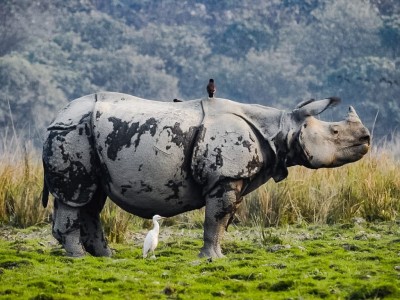
Guwahati, Prime Minister Narendra Modi on Sunday during his monthly 'Mann Ki Baat' programme highlighted the increase in number of waterfowl or 'Jalpakshi' in the world-famous Kaziranga National Park, the role of environmentalist Jadav Payeng, besides temples in Assam.
Referring to an interesting post on the NaMo App by Gurgaon resident Mayur, a passionate bird watcher and nature lover, the Prime Minister said: "Mayur ji has written that while he lives in Haryana, he wishes us to touch upon the people of Assam, and in particular, the people of Kaziranga. I thought that Mayur ji would talk about the rhino, hailed as the pride of Kaziranga. But Mayur ji instead has asked for appreciation of the people of Assam for the rise in the number of waterfowl in Kaziranga."
"I was searching for a common term to describe waterfowl in simple terminology, and found the word - Jalpakshi - birds that nest not on the trees but on water, such as ducks and others," Modi said.
He said the Kaziranga National Park and Tiger Reserve (KNP & TR) authority has been carrying out its annual waterfowl census for some time. This census reveals the population of water birds and also about their favorite habitat.
"Just 2-3 weeks ago, the survey was conducted again. You will also be delighted to know that this time the number of water birds has increased by about 175 per cent compared to last year. A total of 112 species of birds have been sighted in KNP & TR during this census. And of these, 58 species happen to be winter migrants from different parts of the world including Europe, Central Asia and East Asia. The most important reason for this is that here, there is better water conservation along with very little human interference. However, in some cases, positive human interference is also very important."
After the KNP & TR authority's two-day third annual waterfowl census on February 6 and 7, the waterfowl species' numbers rose to 112 from 99.
KNP & TR Director Karmashree P. Sivakumar earlier told IANS: "The number of wetland birds counted in the second census last year was 34,284 belonging to 99 species and the 10,412 waterfowl belonging to 80 species recorded during the baseline survey in 2018."
He said the highest number of species - 26 - are from the family Anatidae, which is the family of ducks and geese. The other species with considerable numbers include gadwall, common coot, lesser whistling duck, Indian spot-billed duck, little cormorant, ferruginous duck, tufted duck, Eurasian wigeon, Asian openbill, northern lapwing, ruddy shelduck and spot-billed pelican.
The top three species counted by number are Eurasian Coot, Bar-headed Geese and Common Teal. Of the 112 waterfowl species found in Kaziranga, 58 are migratory species visiting Kaziranga from different parts of the world including Europe, Central Asia and East Asia, he said.
The Prime Minister on Sunday underlined the dedication and contribution of environmentalist Jadav Payeng of Assam "with whom some of you certainly must be familiar".
"He has received the Padma award for his work. Jadav Payeng is the person who actively contributed in raising about 300 hectares of plantations in the Majuli island in Assam. He has been constantly working for forest conservation and is also involved in motivating people for plantation and conservation of biodiversity," Modi said.
57-year-old Assamese farmer Payeng's homeland, Majuli island, located on the Brahmaputra river in Jorhat district of eastern Assam, suffered a devastating flood in 1979. A significant number of snakes fled away were later found dead on the banks of the river.
The flood had caused a devastating ecological impact which Payeng could not bear. The piles of dead animals lying in scorching heat without any shelter made him understand the importance of trees for ecological and climatic balance. With zeal and conviction to do something for the animals, environment and forest, Payeng started making deep holes into the land with a stick and planted seeds of numerous species of trees in those holes.
Known as "Forest Man of India" Payeng was not an environmental expert, but his enthusiasm, inbred commitment, conviction and strategy paid off well in the long run.
Today, the area has turned into a giant forest that is larger than Central Park, New York, and a plethora of fauna from birds to monkeys and even elephants roam around. While Jadhav has lost count of the number of trees planted by him, his journey is truly incredible and inspiring.
The students of 'Green Hills School' at Bristol in USA in October last year came to know about Payeng and incorporated his work in the Class-VI curriculum as a part of 'Ecology and Environmental Science'. Documentaries demonstrating his course of life are being shown to the students of the school.
Inclusion of a chapter on the Padma Shri awardee in the curriculum of the leading US school has inspired students and academicians across Assam to know more about him. The Prime Minister in his second 'Mann Ki Baat' address of this year also said that temples in Assam are also playing a unique role in the protection of nature.
"If you take a look at our temples, you will find that every temple has a pond in the vicinity. The Hayagriva Madheb Temple at Hajo, the Nagashankar Temple at Sonitpur and the Ugratara Temple at Guwahati have many such ponds nearby. They are being used to save near extinct species of turtles. Assam is home to the highest number of species of turtles. The ponds of these temples can become excellent sites for their conservation and breeding and training about them," Modi said.


.jpeg)

